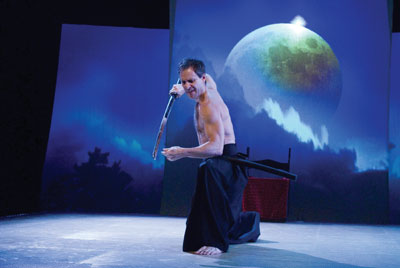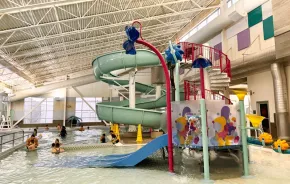
Editor's note: This article was originally published in 2008, and given a quick update for the 450th anniversary of the Bard's birthday.
“… it was Greek to me.” — Act I, Scene 2, Julius Caesar
You may not know it, but you’ve probably been walking around quoting Shakespeare your entire life. Chances are, your kids quote Shakespeare, too. Have you ever had something “vanish into thin air” or “set your teeth on edge”? If so, you have the Bard to thank.
In fact, you are quoting Shakespeare “…if you have ever refused to budge an inch or suffered from green-eyed jealousy, if you have played fast and loose, if you have been tongue-tied, a tower of strength, hoodwinked or in a pickle, if you have knitted your brows, made a virtue of necessity, insisted on fair play, slept not one wink … laughed yourself into stitches, had short shrift, cold comfort or too much of a good thing …” writes Bernard Levin in his book The Story of English.
And Shakespeare gets credit for creating thousands of words we use every day; words such as “dwindle,” “scuffle,” “amazement,” “fashionable” and “rant.” His influence on our language is vast and enduring — and one great reason to expose your sprouts to Shakespeare.
 Shakespeare is good for kids' brain
Shakespeare is good for kids' brain
See, learning Shakespeare is good for you, and good for your kids. Besides giving you the thrill of watching the birth of a favorite word or phrase, it connects you to the rich history of our language.
“Young people need to have an opportunity to participate in the cultural legacy of our society,” says George Mount, artistic director of Wooden O Theatre. “In the same way that the elders of ancient cultures would share stories to bring young people into a knowledge and understanding of their culture, Shakespeare … provides a way to give young people an experience of our shared cultural history.”
Why does that matter? A deeper understanding of classics like Shakespeare is a powerful tool for language development. “If they’re struggling to express themselves, Shakespeare helps them speak their mind,” says Jeff Fickes, marketing manager for the Seattle Shakespeare Company. “It gives them the words to do that. If they can do Shakespeare, they can do anything.
“The stories that you’re seeing in Shakespeare are almost mythic in the way that they’ve entered the culture,” says Fickes. “You’ll find these characters not only in Shakespeare, but in other media: video games, television, other books.”
Fun, bloody fun!
OK, Shakespeare is smart, enriching, empowering — all that good stuff — but is it fun?
Yes! Shakespeare’s best comedies — As You Like It, Much Ado About Nothing, Taming of the Shrew — are witty, droll and packed with great physical slapstick. Even a very young child can see the humor in the dramatic eye roll by the queen who’s rejecting a foppish suitor. They’ll miss the subtler, bawdier jokes that will have parents snorting with laughter. “Different levels are going to get different jokes,” says Fickes. “It’s OK!”
And some kids (like my son) love the tragedies, with their promise of bloodshed and swordplay. “We did a production of Macbeth last year, and the stage fighting was like watching a video game, only live,” says Fickes. These are best for slightly older kids; there can be shouting and themes of violence, meanness and betrayal that some younger kids won’t like.
Getting started
If your kids are younger than about 12, start with one of the many excellent free outdoor summer productions going on in parks all over the Seattle area. Pick a play and then do a little bit of work on the front end. Google the play, find a brief outline of the plot, and read it to your kids in advance. Don’t dwell too much on the details; just give ‘em the basic idea. Tell your kids not to worry too much about following every word (they won’t); instead, tell them to let the language wash over them like a wave.
Understanding Shakespeare takes practice, but the joy is in the journey, and there’s plenty to look at in the meantime.
Pack up a couple of blankets and some great snacks and drinks, and park your stash at the side or near the back of the audience. In this more casual setting, your kids are freer to wiggle and nibble while taking it in. When they’ve had enough, you can take the kids away to play in the park.
When your kids are a little older and more experienced, take them indoors. Try Seattle Shakespeare’s “Short Shakes” performances — abbreviated versions of mainstage plays. If your child is studying a play in school, try to take them to see that play to make it really come alive. There are even comic-book versions of Shakespeare’s plays (see resources), so tweens and teens can read them in advance.
Sitting still for Shakespeare is a practiced art that pays off in great fun and learning. And if your kids get too wiggly, you can always quote the Bard (again):
“Be patient, for the world is broad and wide.” — Act III, Scene 3, Romeo and Juliet
Reading about Shakespeare
- For kids ages 6–11, the "Magic Treehouse" series has a Shakespearean adventure: Stage Fright on a Summer Night by Mary Pope Osborne.
- "The Shakespeare Collection" is a series of Shakespeare plays written in story form for ages 7–10. Published by Hodder Wayland. There are many other Shakespeare collections for young readers, such as this one.
- For ages 9–12, try Shakespeare’s Storybook: Folk Tales that Inspired the Bard by Patrick Ryan. Also for ages 9–12, the Shakespeare Can Be Fun! series by Lois Burdett.
- Several publishers offer Shakespeare plays in graphic novel form; visit amazon.com.
- For adults, don’t miss Shakespeare: The World as Stage by Bill Bryson.
- For an enormously satisfying list of words, check out Coined by Shakespeare: Words and Meanings First Penned by the Bard by Malless, McQuain and Blechman.
- Then have some fun with quotations: The Arden Dictionary of Shakespeare Quotations, compiled by Jane Armstrong.
Shakespeare outings
- King Lear is currently playing at Seattle Shakespeare Company, through May 17, 2014.
- Here's a fantastic Shakespeare road trip: The Oregon Shakespeare Festival, in Ashland, which includes performances of many other plays beyond Shakespeare (this year includes A Wrinkle in Time).
- Two of Seattle’s great Shakespeare companies, Wooden O and Seattle Shakespeare Company, work together to perform Shakespeare outdoors. Dates and locations are at seattleshakespeare.org.
- Green Stage is another Seattle company that performs in the park. greenstage.org









